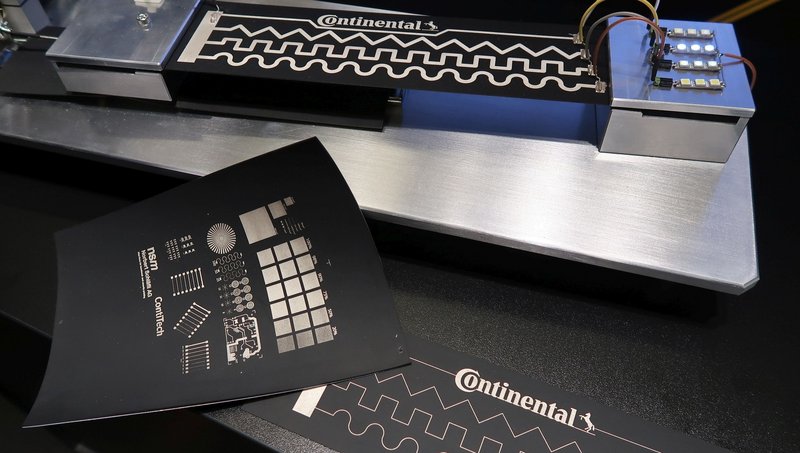Clever and Smart: Continental Project Team Integrates Printed Electronics into Rubber
- Research project under Continental project manager Tim Wolfer combines rubber, plastic and electronics at the Center for Functional Printing Technologies in Freiburg
- The aim is to create an example for many other applications and make possible new business models and services
- Freiburg is the right location with a large network
Test, try, think again. Short paths, streamlined processes, fast results – a small team of highly qualified experts is taking an important step toward the digital future at the new Continental location in Freiburg. “It feels like in a start-up. We’re very flexible and can quickly develop and adapt our processes, there’s a great dynamic here. At the same time, we can build on the power of the entire Continental Group,” says Tim Wolfer, who as project manager coordinates research projects for functional printing processes at the Freiburg site. Here, for example, traditional rubber and plastic products that have previously only performed mechanical tasks are to be enhanced with sensor technology, intelligent systems and actuators, digitalizing them. Wolfer has a doctorate in mechanical engineering and has been responsible for research projects at the Center for Functional Printing Technologies since fall 2020. “My focus here is on integrating intelligent systems and networks. In particular, we are looking at the interface between components made of elastomers and the integration of electronics,” says the engineer. Born in Bremen, he was previously a group leader at the Hanover Center for Production Technology of the University of Hanover for five years. There, he established close contacts with his current employer Continental, among others. The 36-year-old family father was already passionate about tinkering and screwing in his childhood and youth - and studied mechanical engineering for this reason. He came into contact with functional printing as part of his dissertation on the additive manufacturing of optical systems. “Now I’m happy to be able to contribute this knowledge to the research and development of a technology group,” Wolfer adds.
One of Wolfer’s pioneering projects is the “sensIC” project: Integrated sensor technology based on printed electronics is used in hose lines for electric vehicles. Specifically, hoses for the thermal management of vehicle batteries are equipped with integrated temperature sensors. Continental bundles research projects like these at the Center for Functional Printing Technologies in Freiburg; sensIC will run for three years. The Federal Ministry of Education and Research is supporting the project with €2.9 million.
Project is becoming the key to sensor technology and electronics in rubber products
Continental has high hopes for sensIC – above all, a wide range of applications for technology and lower production costs. “In theory, we can use printed electronics anywhere. The product range is virtually infinite and perfectly tailored to Continental’s strategy: Making products intelligent and using them to develop new business models and mobility services,” says Wolfer. “Hoses are just one example. But if it works there, it will also work in air springs, belts, conveyor belts and tires, for example.” And this is precisely one of his exciting primary tasks: Transferring the technology to other areas of Continental.
Industrial benchmark as a goal
“In this respect, the project is a flagship for us,” emphasizes Wolfer. “We’re using highly productive printing processes in this project to manufacture electrical networks. These processes promise a very high throughput of processed surface, and at the same time at a very low cost.” In addition, electronics must be absolutely safe because they are increasingly being installed in cars and systems. This is why the project focuses on safeguarding electronic systems against manipulation and plagiarism.
“The biggest challenge is not only to investigate the innovative technical systems on a laboratory scale, but also to actually manufacture them on an industrial scale with our colleagues in Hamburg later on,” says Wolfer. Because “the systems themselves have enormous complexity on a small scale due to the fine and sensitive structures. As part of the project, for example, one partner is designing and producing a specific silicon chip for us. In the subsequent production facility in Hamburg, however, we are suddenly confronted with challenges such as thermal expansion, solvents, and high pressures and temperatures.” Right at the start of the project, Wolfer and his team accordingly had to estimate the technical requirements at the end, so that they could make a correct selection of materials and concepts right from the start. “It was a challenge to get all the technical goals lined up. But the technical concept is now complete and the project’s running at full speed,” emphasizes Wolfer.
Freiburg is the perfect location
Why? “Very simple: In order to create a central location for this technology, Continental has bundled its functional printing activities here in a technical center. In addition, the Freiburg location was particularly suitable because of the existing close cooperation with a local technical and scientific network, such as Fraunhofer ISE, the Karlsruhe Institute for Technology (KIT) or the ‘microTEC Südwest’ technology cluster.”
Start-up atmosphere, a strong local network, a new printing technology center and an effective international technology company – the conditions for the success of the sensIC project can hardly be better for Tim Wolfer and the project team.

Axel Schmidt
Head of Communications
ContiTech Surface Solutions



